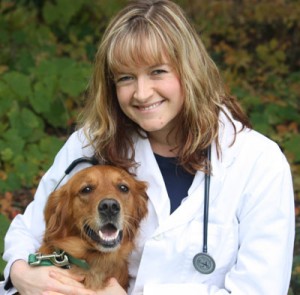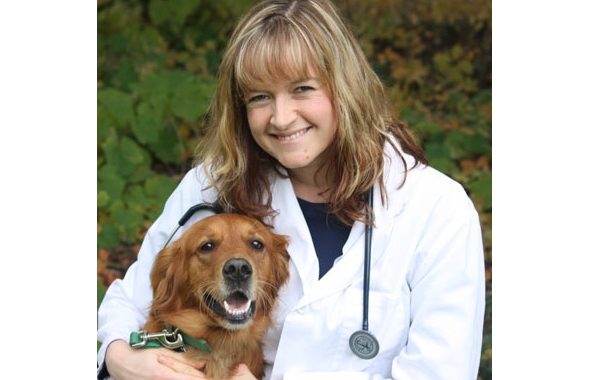Protect pets from their curiosity
By Dr. Rebekah Frost - OBSERVER Columnist

Dr. Frost and Chili
Happy Easter from the Dunkirk Animal Clinic! Our Easter traditions on this day include dressing up in our finest to attend an Easter Sunday church service, Easter egg hunting, and ham dinner with family to follow. Many people travel for vacation or to visit relatives. On this holiday weekend, it is important to remember our pets as we partake in the festivities.
Avoid those ham bones! Ham bones belong in one place — the garbage. Do not feed your pet ham bones. Ham bones can become lodged in your pet’s intestinal tract, can become lodged in the mouth or the back of the mouth, and can splinter and cause severe esophagus and stomach damage. We have seen a few cases of dogs getting the bone lodged around the roof of their mouth. This requires sedation, a bolt cutter, and a very expensive emergency call to remove these bones.
Be cautious with the Easter lilies — Easter lilies are beautiful and fragrant but can be deadly for our feline friends! Any part of the lily plant if ingested by your cat can cause rapid and severe kidney disease. I make sure to put any bouquets of flowers or Lily plants well out of range of our kitties. If your cat has eaten any part of the plant or flower, call your vet immediately as it may require hospitalization and detoxification.
Keep Easter grass in the Easter basket — Cats like string-like things. Some cats like to just play with strings, while others may ingest them. String like objects may resemble grass and cats will eat the grass if they have an upset stomach or a hairball. At our clinic we once removed a wad of easter grass, wire, grape vines, dental floss, and, rubber bands from one cats stomach! Any of these can cause intestinal blockage, intestinal rupture, and systemic infection.
Hide that Easter candy — Chocolate can be toxic to our pets. It contains an agent called Theobromine that can cause vomiting, diarrhea, increased heart rate, seizures, and death. The darker the chocolate, the more toxic it is for our pets. You may start to see symptoms if 0.7 oz/lb of milk chocolate, 0.3 oz/lb of semi sweet chocolate, or 0.1 oz/lb of baking chocolate is ingested by your pet.
Protect your pets while boarding — Many people travel during this time of year, and do not take their pets with them. It is important to do your research and make sure you are leaving your pet in very capable and trustworthy hands. Visit the boarding facility where you plan on leaving your pet. Make sure they require Rabies, Distemper combo, and Kennel Cough vaccines on all the pets in order to board. Make sure they do not let your dog out with other dogs, but that your dog has its own run. We have seen one too many dog fight wounds from doggy daycares and boarding facilities where the pets are all allowed to run together. We highly discourage this!
Protect your pets when company visits — Make sure your pet is in a safe place while company is coming and going. Many people can inadvertently let your dog or cat outside and the holidays are popular times for pets to get lost. Some pets may feel stressed in situations where many strangers are in your home. You may want to find a safe place for them to escape to like a crate or a quiet bedroom away from the commotion.
Above all, we at the Dunkirk Animal Clinic hope you have a wonderful holiday celebrating the Easter season with family and friends!

